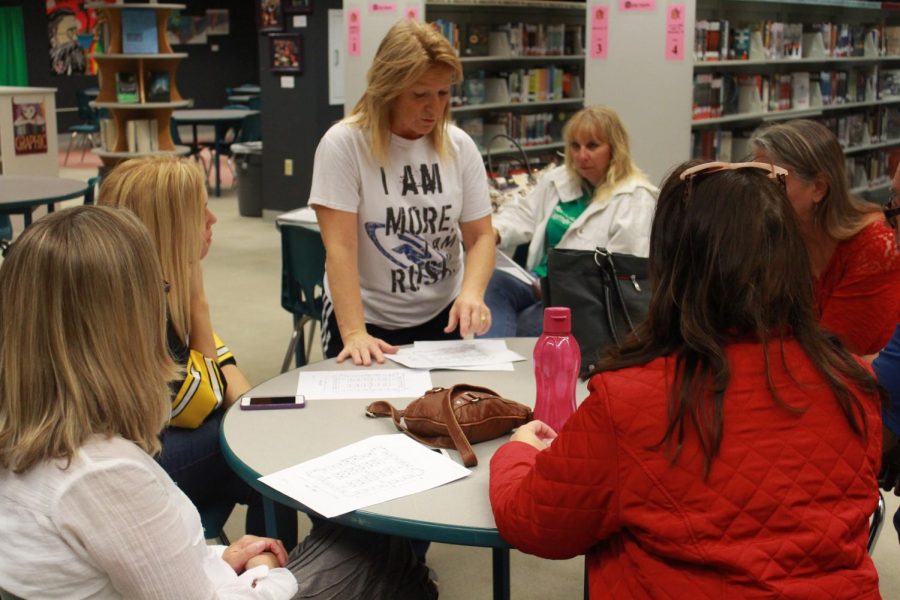The Board of Education Works to Bring in More Funds
Credit to Jared Kinnard
The craft committee sits down to discuss the upcoming meeting for their annual craft fair. The committee is in charge of planning the fair every year.
Published: November 10, 2017
With a balanced budget finally in their hands but two tax levy failures still behind them, the District has turned to alternative ways to bring in revenue. Their target this time: the district’s 11 elementary and five middle school gyms. This business plan, which the Board of Education approved 7-0 at their Oct. 12 meeting, will create a district-wide computer system for renting facilities to outside groups like Boy Scouts, Girl Scouts and junior sports, holding all groups to the same fees and aiming to bring in money that the District doesn’t collect.
“I do think with the community turning down a tax increase twice, they expect the school district to find money elsewhere, and I think this is a palatable solution to start to gain some revenue,” Rene Cope, president of the Board of Education, said. “It’s certainly not going to solve all of our problems, but it is an opportunity.”
Many outside groups that use district spaces pay nothing or pay less than the actual cost because there is no district-wide system for rentals. Despite standard rates, it’s up to each school to decide what to collect, with little oversight because of the lack of a common system. Along with finding that system, the District will investigate and set a standard fee.
The District brings in about $15,000 a year from facility rentals, but it could be as much as $200,000 in the district’s first year with this plan in effect. If the program becomes fully functional in future years, however, it could add over $1 million to the operating budget annually. On top of that, Chief Operating Officer Kevin Supple hopes the program makes it easier for people to rent facilities.
“We decided that we don’t make as good availability of our facilities as we could,” Supple said. “This centralized system would allow us to make sure that our buildings were better utilized to their full potential.”
The District’s next step is to hire someone to purchase an online scheduling system, budgeted at $10,000, and to investigate the details of the plan. Supple and Cope hope the system will go live for second semester.
“What is the right fee to charge? This person will go and investigate that,” Cope said. “What is Wentzville doing? What is St. Charles City doing? What is Fort Zumwalt doing? What kind of liability does the school district have? What kind of insurance waiver should we have on file? All of those are things that actually make a program run.”
This idea was the work of the Non-Tax Revenue Task Force, a group of five core members investigating ways to bring in non-tax based revenue. The Board of Education authorized this group and two others: Extracurricular Activities and Funding, plus Transportation Services. The task force began working May 10 and met throughout the summer, proposing this as their first recommendation at the Sept. 21 board meeting.
“We gave the go-ahead that we think it’s going to be a good idea and that we want to move forward on it,” Cope said of the September meeting. “My initial reaction was that this may be a good way to bring in some additional revenue for the district and make sure that we continue to maintain the quality education that we want to provide for our students.”
While he said he understands the need to collect revenue and ultimately voted to carry the motion, director Mike Hoehn was the only board member to raise concerns about the business plan at the Oct. 12 meeting.
“I would just like to make sure that we’re not excluding some people by imposing these fees on everybody,” Hoehn said at the meeting. “If there’s somewhere in this plan that makes sure that there’s some type of reserve, some type of fund, for these organizations that may not have the funds but do need these facilities, that somehow we can accommodate them.”
Ganon Evans, FHHS senior and student representative at the October meeting, says the District should reevaluate how it spends its money currently before trying to bring in more revenue, echoing a concern common throughout the district when it comes to plans like this one.
“Our priority is making sure that we are mastering the money so that when more money is sprinkled on top, it’s not just going into those incorrect areas again,” Evans said.
While Supple and Cope hope this additional revenue will help support the district, it is only one step toward meeting its financial needs. The taskforce will continue to investigate ways to make money, including potentially selling FHSD curriculum to other districts or offering online classes to other schools for a fee.
“We look to attract and maintain qualified educators, and we want to make sure that our students are learning the best way that they can,” Cope said. “Not every student learns the same, so what are our opportunities to make sure we meet each child where they are in their educational journey? And then how do we make sure that they’re in a safe and secure environment? Those are some of our larger pillars that we focus on, and additional funding will continue to support those efforts.”







![JV Girls Basketball Takes A Win To FZE On The First Game Of The Season [Photo Gallery]](https://FHNtoday.com/wp-content/uploads/2024/12/voccer10.24_kwallace-3-300x200.jpg)
![It's Time for the BOE to Respect Student Input [Editorial]](https://FHNtoday.com/wp-content/uploads/2024/11/Untitled_Artwork-1-300x173.png)



